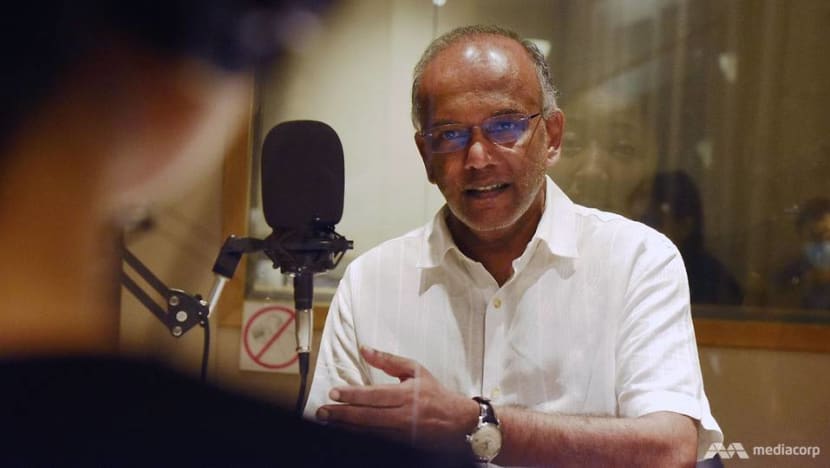Review on women's issues goes beyond the law, aims to 'deeply ingrain' gender equality in society: Shanmugam

Law and Home Affairs Minister K Shanmugam in a CNA podcast interview on Sep 23, 2020. (Photo: Try Sutrisno Foo)
SINGAPORE: A review on women’s issues in Singapore will look more closely at how gender equality can be more deeply ingrained in Singapore society, so as to tackle the roots of behaviour that lead to sexual offences, said Minister for Law and for Home Affairs K Shanmugam.
In CNA's Heart of the Matter podcast that was published on Thursday (Sep 24), Mr Shanmugam was asked about controversies regarding recent high-profile sexual offence cases. He said stricter laws and heavier penalties are only one side of the issue.
"I can change the laws and make them stiffer, I have already have done so with Parliament's approval. But that's only one aspect, there is something more fundamental. What if we actually got young boys and girls thinking differently about equality, accepting equality as a fundamental principle?” he said during the interview on Wednesday.
"I felt that there was room, and my Cabinet colleagues felt that there was room, to try and engender a different spirit in society. So here we are talking about the soul, not just about punishment.”
Mr Shanmugam had announced on Sunday that the Singapore Government will do a full review of women’s issues, which will culminate in a White Paper by the first half of next year.
RESPECT FOR WOMEN AS A "FUNDAMENTAL VALUE"
There will be a series of engagements held with the aim of identifying and tackling issues concerning women in Singapore. Minister of State for Social and Family Development Sun Xueling, Minister of State for Culture, Community and Youth Low Yen Ling and Parliamentary Secretary for Health Rahayu Mahzam will lead the review.
One of the things that the three co-chairs will examine is how gender equality and respect for women can be more deeply ingrained as fundamental values from young, Mr Shanmugam said in the Heart of the Matter podcast.
“If (gender equality) is more deeply ingrained, my hope is that (potential offenders) will be less inclined, or they will understand the consequences much more, and then they will not treat it like a prank or something to satisfy themselves, they will more carefully consider that they should not (commit the offence),” he said.
READ: Singapore to embark on a review of women’s issues in move towards greater gender equality, leading to White Paper next year
When asked if recent cases of crimes against women suggest deeper and more fundamental issues, Mr Shanmugan replied: "I wouldn't be so pessimistic." He said statistics show that there are fewer crimes against women in Singapore than in most other places, and the laws against such crimes are tough.
And while how sexual offences were dealt with was one of the issues that led to the upcoming review, the exercise is intended to be far wider and encompass many other aspects of gender equality, he said.
“STRUCTURAL ISSUES”
Speaking of his own experience in the legal industry, he said that women were well-represented there, but this was not necessarily the case in other sectors.
The proportion of women on the boards of the top 100 primary-listed companies in Singapore was only 16.2 per cent as of last year.
“I was a lawyer in private practice and in my firm, which was then the largest law firm in Singapore, more than half the partners were women. Three out of the five members of the top policymaking body were women,” he said.
“So, you know you're surrounded by all these highly articulate, talented, very bright women, and you don't go away thinking that women are somehow oppressed.”
But there are some structural issues in Singapore which are “products of (the) socio-cultural system” and have not been dealt with yet, he said. For example, women take up more care-giving responsibilities, and many have to choose between family and career.
These issues cannot be dealt with by the Government alone, he said, noting how in Scandinavian countries, fathers are expected to take time off work to help look after their children.
"It tells you the role that men play is very important in trying to have a changed perspective, and that can't be done by the Government alone ... I think these are all things that need to be looked at."
QUOTAS AND TOKENISM
When asked how far he would go to ensure better representation of women on company boards, as corporate leaders and in Parliament, he said that he does not see quotas as a viable solution.
"Generally, our approach has been to eschew quotas, because quotas are a short route to tokenism, and the women who make it on their own merit, and there are large numbers of them, could also be tarred with the same brush ... there is also that risk,” he said.
"And we may hobble businesses and banks and so on, by requiring them to have a certain number when they are not ready to do so. But I think it is possible to give a much stronger push ... to incentivise, for example, through corporate governance measures.”
READ: Women in Singapore earn 6% less than men for similar work: MOM study
GENDER PAY GAP, NATIONAL SERVICE
Similarly, the answer to the gender pay gap in Singapore is not necessarily a “fiat by Government” that there should be equal pay, he said.
“You want to create the mindset, you want to deal with the social and cultural issues, you want to make sure that equality of opportunities, you want to define equality as a fundamental value,” he said.
"You want to do everything possible to push society in that direction, and then, these things, you should try and let the market deal with that.”
When asked for his response to the argument that true equality requires women to do National Service, he laughed and said: “I will ask those people to go and try being a woman. And to get through the lived reality, and … look at the challenges that women go through.”
Mr Shanmugam added that while most in Singapore would agree with gender equality in principle, the real issue is how it can be actualised.
"What does it mean when the rubber hits the road? In the workplace, in schools, in terms of promotions, in terms of recognising the woman's role in caregiving? ... There will be, I think, significant divergences of view points, and we don't have all the answers," he said.
"The task that the three women co-chairs are engaged in, is to try and see where consensus can be obtained in all of these areas and then put up a White Paper."
Listen to the full episode of Heart of the Matter podcast with Mr Shanmugam where he speaks about why gender equality is important for Singapore.
New episodes of Heart of the Matter are published every Thursday at cna.asia/podcasts.
















